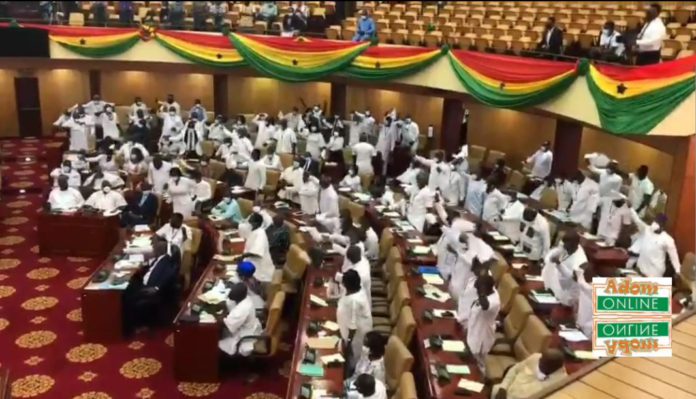Nine Members of Parliament (MPs) have laid a Private Member’s motion to have the House pass a law to streamline and mainstream Corporate Social Responsibility (CSR).
The aim is to ensure cogent, equitable and sustainable national development.
The motion will push for the enactment of a well-defined legal framework that will ensure that corporate bodies adhere to the best practices of CSR that will allow communities where such entities operate to reap the maximum gains from their operations.
The motion is also targeted at pushing for the establishment of a specific institution to monitor what companies offer to communities in return, thus, ending the practice of knee-jerk responses that businesses provide in times of agitation by communities.
Initiators of motion
Laid in the House last Friday, the motion is being initiated by members from both sides of the House.
Those from the New Patriotic Party (NPP) are the Majority Chief Whip, Frank Annoh-Dompreh, who is also the MP for Nsawam-Adoagyiri; MP for Manso-Adubia, Yaw Frimpong Addo; MP for Kwadaso, Dr Kingsley Nyarko; MP for Old-Tafo, Vincent Ekow Assafuah, and the MP for Dormaa East, Paul Apreku Twum-Barimah.
MPs from the National Democratic Congress (NDC) are the MP for North Tongu, Samuel Okudzeto Ablakwa; MP for South Dayi, Rockson-Nelson Dafeamekpor; MP for Awutu Senya West, Mrs Gizella Tetteh-Agbotui, and the MP for Techiman North, Mrs Elizabeth Ofosu-Agyare.
Motive for motion
Speaking in an interview with the Daily Graphic on the reasons for initiating the motion, Mr Annoh-Dompreh lamented the absence of a dedicated legal framework “consciously dedicated” for the enforcement of CSR in Ghana.
Currently, he said, it was only the Directive Principle of State Policy under Chapter 6 of the 1992 Constitution that sought to push for CSR, that had caused communities and the country as a whole to reap less from the practice.
READ ON:
“It, therefore, has become like a knee-jerk reaction. When the community people complain then the companies come and drop anything in their pan and I do not think that is the way to go.
“We should have a well-defined legal framework which will be monitored by an institution to ensure we generate the necessary help from these corporate bodies,” Mr Annoh-Dompreh said.
The Nsawam-Adoagyiri MP pointed out that he had consulted widely with the corporate world that had considered the urgent need for a piece of legislation to be passed.
“Again, giving back to the country should not be at the discretion of these companies. Why is it that a company goes to build a two-bedroom house for a whole community and they feel they have executed on CSR?” he asked.
Raking in benefits
According to him, with so much interest on the African continent, including Ghana, the enactment of a CSR legislation would help “to position ourselves to rake in the needed benefits.”
He noted that globally most countries such as the United States of America had a robust blueprint that focused on the enforcement of CSR.
With regard to the Europe Union, he said the union in 2011 came up with a green paper that looked at the evolution of CSR in Europe.
With most places such as Russia, Europe and China showing dramatic interest in investing in Africa and Ghana, Mr Annoh-Dompreh said, the need for countries to position themselves to rake in the maximum benefits from foreign direct investments had become more critical.
“What it tells me is that we on the continent must also position ourselves to be able to buy into this dramatic show of interest in Africa,” the MP stated.
Align your CSRs
The MP for Dormaa East, earlier in an interview with the Daily Graphic, advised corporate entities in the country to align their CSR plans and projects to the developmental agenda of the government to help harmonise, streamline and fast-track project development in the country to the benefit of the people.
Mr Twum Barimah said the era of government embarking on one project agenda while the corporate community undertook different development agenda culminated in waste of funds and resources and sometimes ended in having projects at places where they were not needed.
“What is happening now is that government seems to be doing something and corporate institutions will also be doing something else in terms of provision of developmental projects,” he said.
The harmonisation is needed to cushion development because the expenditure of companies on corporate social responsibility is not free,” he said, and added that such a legislation would help bring the needed harmonisation into the CSR space.
Mr Twum Barimah said if such projects were aligned and developed coherently they could relieve the government of some burdens such as fixing everything everywhere in the country with meagre resources.


